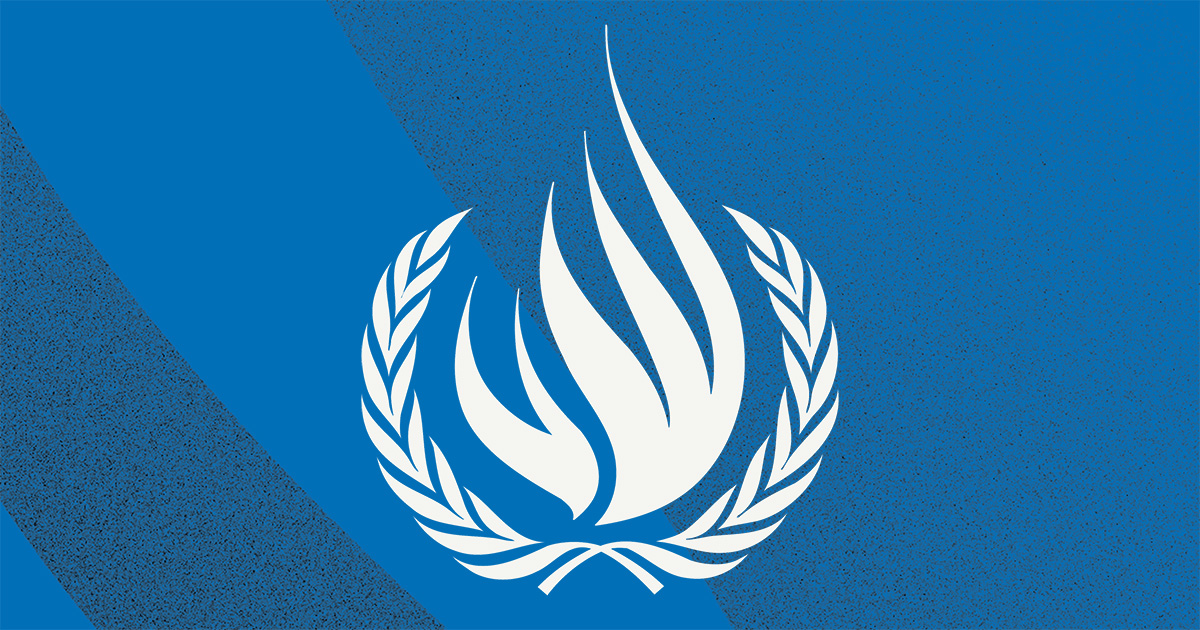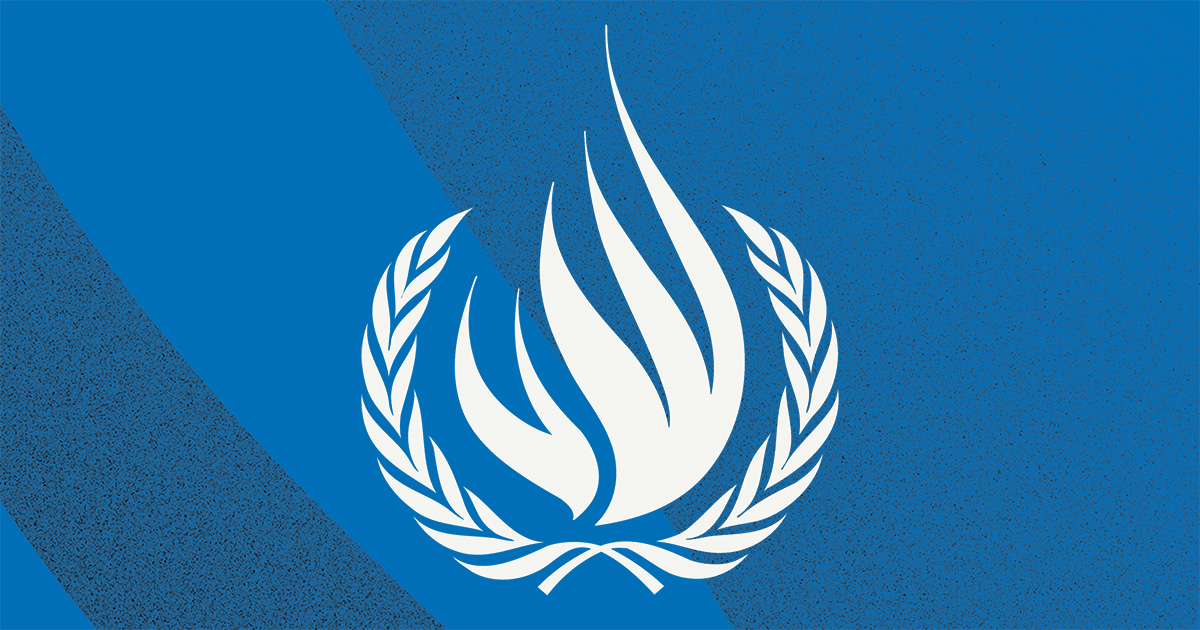
55th Session of the UN Human Rights Council
Geneva, 18 March 2024
Monsieur le Président, Excellences, Good afternoon,
Since we last reported to you six months ago, Syria has become a yet more dangerous place to live and we have seen the largest escalation in violence in four years, with active hostilities on multiple fronts.
Following the 5 October deadly attack on the Homs Military Academy, Syrian and Russian forces bombarded opposition-controlled areas around Idlib, attacking schools, markets and IDP camps with hundreds of civilians killed and injured and 120,000 people displaced.
In just a few days, Government forces used internationally banned cluster munitions in densely populated urban areas, shelled no fewer than five well-known hospitals in central Idlib and conducted direct attacks on first responders. Rather than places of sanctuary, hospitals in northwest Syria are considered risky places to be. An aid worker told us that as soon as a patient is able to stand up, they want to remove all tubes and go straight home since they’re afraid the hospital might be targeted.
In the same period, Turkish forces attacked areas held by the Syrian Democratic Forced (SDF) in north-east Syria in retaliation for a PKK-claimed attack in Ankara. Aerial attacks on power stations disrupted essential services to the population and deprived nearly a million people of water for weeks.
Civilians in Eastern Syria were also killed, arbitrarily detained or displaced amidst clashes between the SDF and a coalition of tribal fighters. With no prospects of settlement in sight, this in-fighting creates further instability in an area where Da’esh remains active.
In fact, Da’esh is stepping up its attacks, targeting civilians in attacks that may amount to war crimes. Da’esh claimed 35 attacks in the first half of January alone. We are investigating new reports of Da’esh attacks in the “Badia” desert, in central Syria, against civilians, including women and children, as they gathered truffles.
Meanwhile, since 7 October and Israel’s Gaza onslaught, attacks between the United States and alleged Iran-backed groups, as well as strikes by Israel, have significantly increased. Of at least 35 Israeli attacks occurring since then, some struck Syria’s major airports which lead to temporary closures, affecting vital UN humanitarian air services.
Reports of deaths in Syrian State custody continued, including in Sednaya military prison, while authorities obstructed and profited through extortion from families’ efforts to discover the whereabouts of their detained relatives. People criticizing online the decision to lift State subsidies in August were detained by the security apparatus, including in areas traditionally supportive of the Government.
In Suweida, protests since August 2023 have demanded both economic and political reforms; a reminder that the grievances that led to the wide-scale protests in 2011 remain unaddressed, 13 years in. We are concerned by reports indicating that the authorities may have used live ammunition against unarmed protestors last month and urge all parties to respect peaceful freedom of assembly.
In SNA areas, notwithstanding efforts to improve the treatment of detainees, torture and ill-treatment continued in detention facilities run by specific factions, who also continued to unlawfully confiscate property, including olive harvest, from civilians.
In Idlib, HTS continued to commit acts amounting to unlawful deprivation of liberty, including in a manner tantamount to enforced disappearance, with reports of executions based on summary trials. Several women’s rights organizations suspended their activities owing to threats, denial or delays of permits required by HTS.
One year after a major earthquake, daily life for civilians worsened with a deepening economic crisis and dwindling funding for aid. A severe shortfall in donor funds has forced the World Food Programme to suspend regular food aid in Syria, placing millions in the grip of hunger. Three out of four people inside the country now need humanitarian aid such as food, water and medical care. Yet aid deliveries are at risk of non-approval by the Syrian Government and hampered by sanctions.
Monsieur le Président,
As much as the world may wish to forget, in north-east Syria, five years after the fall of Baghouz, almost 30,000 children continue to be unlawfully detained in conditions amounting to cruel and inhuman treatment. Let me repeat: 30,000 children, detained for five years! These children were victimized in the grip of Da’esh, only to be again subjected to a range of human rights abuses in the years following its territorial defeat.
We urge all States, including Syria, to immediately allow all children to return home from the camps and to ensure their reintegration into society, while pursuing efforts towards accountability for Da’esh crimes. We commend the States who already followed this path, demonstrating how this can be done effectively. More should follow suit. You are all kindly invited to a side-event we are organizing on this issue on Wednesday afternoon, here in the Palais de Nations, and I encourage you to read a background policy paper that we just circulated. Our call to all States is: release the children!
Regrettably, the prospects of a political settlement for Syria appear more remote than ever. Little or no progress has been made on the key issues – security, refugees and drugs – that induced the League of Arab States to bring Syria back into the fold nearly a year ago.
On the contrary, Syria is not safer and many more Syrians still flee from rather than return to their country. Land owned for generations is being sold to pay smugglers for a potentially life-threatening journey to safer shores. The number of Syrians seeking asylum in Europe in October reached the highest level in seven years – 24,000 in just one month – while the number returning decreased by 27% –with only some 37,000 voluntary returns tracked by UNHCR last year. Nevertheless, we are encouraged by the remarks of the Syrian Vice Minister for Foreign Affairs at the Second Global Refugee Forum in December. He affirmed Syria’s continued efforts to work with UNHCR to ensure “greater and broader humanitarian access and a flexible and predictable presence of UNHCR, especially in the main areas of return and border points.” We look forward to seeing how this agreement will be implemented.
M. President, Excellences,
Contrasting with this grim picture, we are heartened to see innovative initiatives by Syrian civic activists and victims’ associations to promote justice and accountability.
These efforts have been instrumental to the establishment of the Independent Institution for Missing Persons, which is due to begin its work next month, and which will continue to need your support for its efforts and for the significance of the contribution its work could make, to the lives and hopes of countless Syrian individuals and families, and indeed to the future of their country.
Syrian civil efforts have also been key in amplifying voices of survivors of atrocities in international fora, including around the proceedings brought by Canada and the Netherlands before the International Court of Justice that resulted in the ICJ’s provisional measures aimed at preventing acts of torture and ill-treatment in Syria.
Such creative efforts should continue to be supported.
In closing, I call on Council members to not lose sight of the Syrian crisis. Syrians face unprecedented hardship. 16.7 million now require humanitarian assistance, the largest number since the start of the crisis. After nearly 13 years and the killing of more than 300,000 civilians, what we need now more than ever is an immediate ceasefire, an end to the conflict and to find an inclusive path towards a just political settlement.
Thank you.







